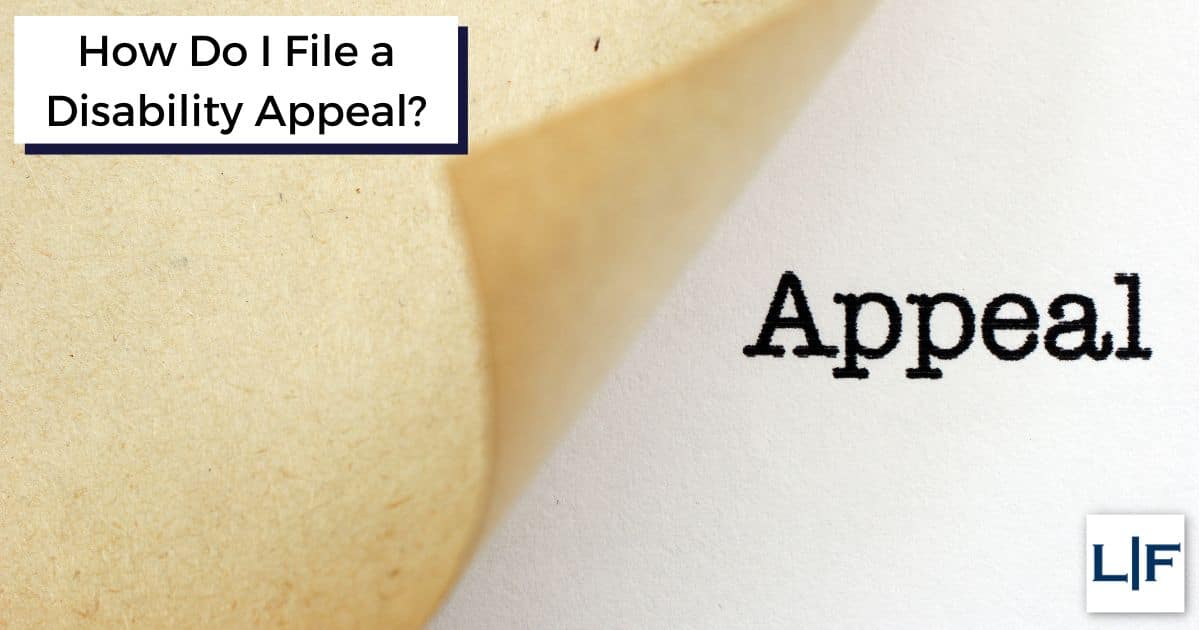You gave Social Security Disability all the information they asked for and agreed to a medical exam, but your disability claim was still denied. It can be frustrating to be denied benefits after putting in so much effort. Fortunately, the Social Security Administration has an appeals process, so don’t let the disappointment of your denial prevent you from pushing forward to get your benefits. When you receive the “Notice of Disapproved Claim” and you disagree with the disability decision, you can move forward with an appeal. Keep reading to learn more about the Social Security Disability Appeal Process
You might want to talk to a lawyer to increase your chances of getting the benefits you deserve. Applicants who have an experienced Social Security Disability lawyer on their side have a better chance of getting benefits than those who don’t have a lawyer. The Social Security Disability attorneys at Lunn & Forro have more than 50 years of legal experience and knowledge of disability law to help you move forward with the appeals process.
Should I File an Appeal or Start a New Claim?
Generally you should file an appeal, rather than starting all over from the beginning, until you have a decision after the hearing with the SSA judge. If a judge has denied your claim then you can either file an appeal to the Appeals Council or file a new claim, but you cannot do both at the same time. If you choose to go to the Appeals Council and the claim is denied, then you can file a new claim even if you file an appeal to the Federal District Court.
There are several things to consider when deciding whether to appeal or start a new application. Some of those issues include whether or not you are still eligible for Title II benefits based on your earnings record, whether your age category has changed or if you have new health issues or additional medical treatment. Those are just a few examples and if you have an attorney representing you they can review your case with you so that you understand your options and any specifics you should consider when making your decision.
What Information Do I Need to File an Appeal?
In order to file the first two levels of appeals you will need to provide the following information:
The name and contact information of someone else who knows about your illnesses, injuries, and conditions AND is willing to provide information to SSDI representatives.
An update of any changes in your condition since you filed your initial disability report, including new physical and mental limitations and new conditions
Updated medical staff contact information.
Details about each medical test you’ve had since the last time you filled out a disability report.
A complete list of all current prescription and over-the-counter medications you are taking, as well as the doctor who prescribed them.
Appeals following the denial by an Administrative Law Judge require you to provide legal arguments as to why the judge’s decision in your case is not correct but you will not usually be submitting any updated medical information.
How long do you have to file an appeal?
Social Security appeals are due within 60 days of the receipt of the denial. SSA assumes that you received the decision within 5 days of the date on the denial. Technically this means that you have 65 days from the date on the decision, but it is never a good idea to wait until the last day. You should file your appeal as soon as you can after the denial arrives in the mail.
How Long Does a Disability Appeal Take?
The time it takes Social Security to make a decision on a disability appeal varies widely based on many factors, including the state you live in, the level of the appeal you filed and the volume of medical records included in your claim. Social Security is not required to make a decision within a specified time. SSA publishes average processing times, but the number provided is only an average and is based on nationwide numbers and not the numbers in your local area. For example, in 2022, the average nationwide processing time for a Request for Reconsideration was 183 days which is about six months. That means that one-half of the claims took less than 183 days, but that one-half of the claims took longer than six months.
Steps in the SSD Appeals Process
Request for Reconsideration
Making an official appeal request is the first step. Both the Request for Reconsideration and Disability Report must be submitted. Your local Social Security field office will process the appeal and then transfer it to the State Disability Determination Services office. A different examiner and physician(s) than the ones who were initially assigned to your case will review your medical records and any additional information, and they will come to a new decision about your disability.
Request for Hearing Before an Administrative Law Judge
You must fill out a Request for Hearing by Administrative Law Judge and a new Disability Report. Although you can ask that the judge make a decision just based on the evidence in your file, you should request an actual hearing with the judge. The hearing is your only opportunity to speak to the judge about your health conditions and explain why your symptoms prevent you from working. You can choose to have your hearing in person with the judge, over a video session (which you can do from your home or a Social Security office), or by telephone. If you have an attorney or other representative they will prepare you for the hearing. The hearing is also the opportunity to make any legal arguments you have regarding your eligibility for benefits. After the hearing you will receive a decision from the judge in the mail.
Request for Review by the Appeals Council
You must complete a Request for Review of Hearing Decision. You do not need to fill out a new Disability Report because the Appeals Council only considers the evidence in your file at the time the judge made the decision and your testimony and arguments made at the hearing. You must provide legal arguments that explain why the judge’s decision in your case is incorrect.
There are only a few exceptions that allow the Appeals Council to consider new evidence. Once the appeal is processed, the local office will send it to the Appeals Council. When you file your appeal online, it is automatically forwarded to the Appeals Council. request will then be sent to the Office of Disability Adjudication and Review. Once the assigned reviewer has looked over the evidence and any arguments you made, they will notify you in writing of the decision on your case.
The Appeals Council performs the highest level of agency review of your claim. If the Appeals Council denies your claim then you will need to file a case in Federal District Court.
Appeal to the Federal District Court
Although you always have the right to represent yourself in any Social Security disability claim, it is advisable to have an attorney represent you in a court case. There are strict requirements about how the Complaint and supporting documents must be written, filed and served on the government. You will be required to submit a legal brief making arguments supported by disability regulations and caselaw. This can be a very difficult task for non-lawyers and even more overwhelming for someone without legal training who is also unable to work due to their health problems.
Not all disability lawyers handle cases in Federal District Court, but if you contact an attorney who focuses on disability cases in your state they will likely know the attorneys that handle cases in your state. Only an attorney licensed in your state and who has been admitted to practice in your District Court can represent people in this type of case.
In other types of cases, the FDC is the first time a case is considered and a decision is made. However, in Social Security cases the FDC considers the claim as an appellate review. This means that the Court is making a decision about whether or not the Social Security Administration followed the law in making the decision to deny your claim.
If the FDC denies your claim you can make a further appeal by filing with the Court of Appeals and following a denial at that level you can file a Social Security disability appeal to the United States Supreme Court.
Related Posts

What is a consultative exam?
A consultative exam is ordered when Social Security believes that they need more medical information to make a decision in your case. This exam is

How Much Does a Disability Lawyer Cost?
Lawyer fees in Social Security cases are contingent. So the short answer is that it costs you nothing up front to hire a lawyer at

How Long Does It Take to Get Social Security Disability?
“How long does it take to get Social Security Disability benefits?” is probably the most common question that our clients ask. Every case is different,

Do I Need a Disability Lawyer to get SSDI?
Many people wonder if they really need the help of a disability lawyer to obtain their Social Security benefits. You May Not Need a Disability
Notice of Hearing – Social Security Disability
The wait for a disability hearing varies from a few months to over a year, and once the Request for Hearing is filed, you will
I fired my disability lawyer. Now I need a fee waiver. What do I do?
Whenever a disability lawyer withdraws from a case, either on their own or at their client’s request, they must decide whether or not to waive
The Role of a Social Security Disability Attorney
When people are faced with applying for Social Security disability benefits, many wonder if it is worthwhile to hire an attorney. After a life-altering disability
I do not have a way to get to work. Why did the judge tell me that it doesn’t matter?
When SSA is making a decision about whether or not you meet their definition of “disabled” they are only concerned with one thing. SSA wants



